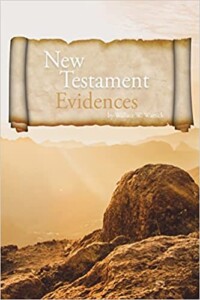Title: Evidence for the New Testament
Author: Wallace Wartick
Publisher: Harper Partners LLC
ISBN: TBA
Genre: Religious Studies
Pages: 242
Reviewed by: Lisa Brown-Gilbert
Pacific Book Review
 Well-known author and teacher of Christian Biblical studies, author Wallace Wartick, adds to his religion-based compendium of knowledge-affording works with Evidence for the New Testament. This is a work which serves as an update to a previously released and well-respected theological study, John W. McGarvey’s book, Evidences of Christianity. Originally written over one hundred years ago at a time when there was a split in beliefs about the Bible’s contents. McGarvey wrote his book in order to prove the Bible was the true written word of God, particularly the New Testament, and not the contrary belief that the Bible was a tainted document written by men.
Well-known author and teacher of Christian Biblical studies, author Wallace Wartick, adds to his religion-based compendium of knowledge-affording works with Evidence for the New Testament. This is a work which serves as an update to a previously released and well-respected theological study, John W. McGarvey’s book, Evidences of Christianity. Originally written over one hundred years ago at a time when there was a split in beliefs about the Bible’s contents. McGarvey wrote his book in order to prove the Bible was the true written word of God, particularly the New Testament, and not the contrary belief that the Bible was a tainted document written by men.
Generally, this work presents a comprehensive and thoroughly detailed journey into Bible studies, with emphasis on the New Testament, the text follows the format of its preceding version. Altogether, the totaling ten chapters in this book presents a well-versed scholarly work, which does a true service by helping to clarify aspects of Biblical text, history, and garners further curiosity in Bible studies.
Beginning with Chapter 1, starting things out with purviewing Faith and Evidence, which brings to the attention how one’s personal mindset may correlate to belief/faith in the word of God contained in the Bible, as true. Next, Chapter 2 addresses The Text: Lost and Found which presents an intriguing look into the autographs of the New Testament, or also known as the original work from the original author. This chapter delves into errors, variations and other versions used, also offering quite a different historical perspective of Biblical cannon. Chapter’s 3 and 4 centers on the authors of the New Testament and their credibility. The remainder of the book continues to stimulate the spiritual mind including the topics of The Inspiration of the New Testament authors, Translations and Biblical Text, The Patristic Quotations, Greek Sources, Scholars, and Sleuths of the manuscripts, and ending with Textual Data and Critical Methods.
Overall, Evidence for the New Testament embodies an intensely knowledgeable study of the New Testament with which author Wallace Wartick presents a well written, intensely insightful resource for Bible studies. Also, he includes the beneficial additions of a section for notes, detailed bibliographies replete with relevant further reading resources, as well as FYI sections, which provided a summary of the chapter and a peek into the next. Altogether this work culminated into forming a worthwhile scholarly read that I found wholly (no pun intended) edifying.


